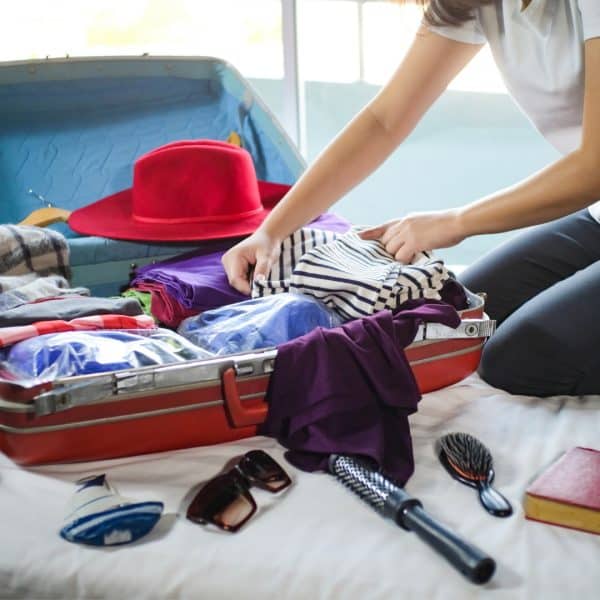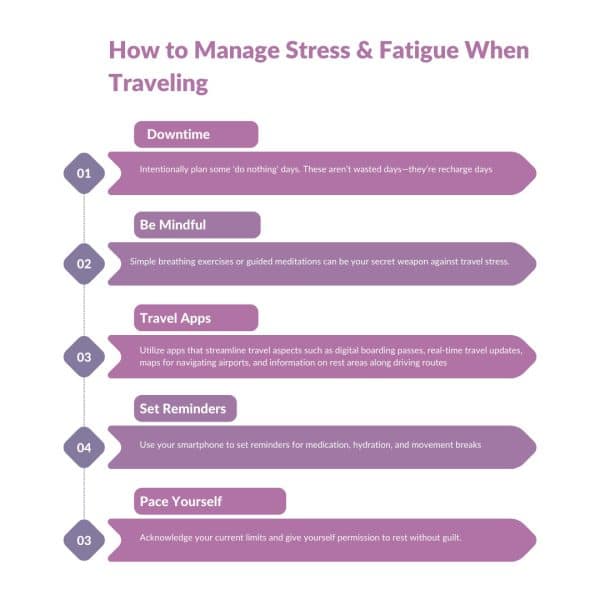Please note: This post contains Amazon affiliate links. As an Amazon Associate, I earn from qualifying purchases. This will in no way impact the price you pay. Affiliate links in this article are denoted with an asterisk (*).
Ah travel — yes, with summer just around the corner it’s time to hit the road again. It’s the stuff of dreams and Instagram feeds. But when you’re managing an autoimmune condition, it can feel more like an endless nightmare than a vacation. Don’t worry, though! With a bit of planning and some insider tips, you can still stamp your passport with style (and minimal stress).
Walking through airports, seeing the sights, and sampling strange foods—all exciting. But with an immune system as unreliable as the Wi-Fi signal in the mountains, those can be just a little tricky. For one thing, managing fatigue is a bit like trying to keep a melting ice cream cone from plopping on the ground: you may be able to save it, but it might get a little messy. You’ll need to pace your activities to ensure that you don’t run out of steam.
In this article, I’ll give some tips (some not so obvious) to help take the stress out of traveling with autoimmune issues. Let’s dive in.
Pre-Trip Planning
Prepping for a trip is like prepping for a marathon, but instead of carb-loading, you’re info-loading.
- Healthcare Homework: A quick check-up before you jet off can set your mind at ease. Make sure your doctor thinks you’re as fit to travel as you do. Getting a green light from your healthcare provider is like snagging a fast pass for your health.
- Packing the Essentials: Packing for a trip is an art, especially when you need to fit your entire bathroom cabinet into your suitcase. Remember to pack your medical must-haves in your carry-on, because nobody wants to arrive in Paris without their meds. Oh, and bring snacks—airport food prices are the only thing scarier than a flare-up!
- Check Weather Extensively: Autoimmune symptoms can sometimes flare up with weather changes. Check the extended forecast for your destination and plan accordingly, bringing appropriate clothing and any necessary gear to handle sudden weather shifts.
- Contact Local Support Groups: Before you travel, try reaching out to local support groups or online forums for people with similar conditions in the area. They can offer invaluable advice and resources, including where to find suitable food stores or restaurants.

Time To Pack
Packing for travel with an autoimmune condition isn’t just about choosing the right shoes—it’s about packing the right tools to keep you feeling your best.
- Comfort Items: Think of your suitcase as your mobile command center. It should have everything from comfy shoes (because who wants blisters?) to a trusty travel pillow (*) (nap time is anytime). And don’t forget layers! Weather can be as unpredictable as your symptoms. Some essential oils can help manage stress or aid in sleep, which can be particularly useful when traveling. Likewise, packing a familiar comfort item like a small blanket or pillow can help ease travel anxiety and promote better rest.
- Medication Musts: Apart from your usual meds, consider packing things like pain relief gels, digestive aids, and anything else that makes bad days better. And remember the rule of two: always pack double the amount of medication you think you’ll need, because running out is not an option. Besides keeping medications in your carry-on, consider packing small doses separately in different bags or pockets. This way, if one pack gets lost or is inaccessible, you’ll have a backup readily available.
- Thermal Insulated Bags for Medication: Some medications need to be kept cool. Packing a small thermal insulated bag (*) with gel ice packs (which are generally TSA-approved) can help keep your medication at the right temperature throughout your journey.

Choosing The Right Place To Stay
This is a big one! It’s not just about price — accessibility and comfort are equally important.
- Stay Smart: Choose accommodations that are not only cozy but convenient. Proximity to attractions can save energy for fun rather than long commutes. And if stairs are your nemesis, a room on the ground floor might just be your best friend.
- Look for Allergy-Friendly Rooms: Some hotels offer allergy-friendly rooms that have undergone special cleaning processes and have air purifiers installed. These rooms typically have minimal dust and are free from potential irritants like pet dander and smoke.
- Check for HVAC Controls: Ensure that your room has individual climate control. Being able to adjust the room temperature to your comfort can be crucial, especially if temperature fluctuations affect your symptoms.
- Opt for Accommodations with Full Kitchens: While it’s common to consider hotels with kitchenettes, opting for accommodations with full kitchens can be a game-changer. This includes a full-size refrigerator, stove, and microwave, which can make meal prep easier and more varied, allowing for strict dietary control.
- Proximity to Local Groceries: Check if there are grocery stores within easy walking distance or a short drive from your accommodation. Being close to food sources where you can purchase fresh and suitable ingredients is invaluable.
- Consider Location: Instead of staying in bustling city centers or near nightlife areas, look for quieter neighborhoods or hotels that advertise a peaceful environment. Noise can disrupt sleep and increase stress, which might exacerbate symptoms.
- Boutique or Residential-style Hotels: Smaller boutique hotels or residential-style accommodations often offer a more controlled environment that can be quieter and less crowded. These types of accommodations may also provide a more personalized service, which can be beneficial if you need special accommodations for your health.
What About Transportation When Traveling
It might take a little extra planning but it’s so worth it as you’ll feel more comfortable and less stressed. When it comes to getting around, think easy and efficient. Rental cars with automatic transmission? Yes, please. Trains with first-class seating? Even better. Anything to keep the journey smooth and your joints happier.
- Break Up Long Journeys: Instead of enduring long, continuous travel segments, consider breaking them up into shorter legs. This can help manage fatigue and reduce the physical strain that comes from sitting in one position for too long, which can be particularly beneficial for those with joint pain or muscle stiffness.
- Flexible Scheduling: When booking transportation, choose options that allow for flexibility such as refundable tickets or those that can be easily rescheduled. This flexibility can be crucial if you need to change plans due to a flare-up or fatigue.
- Accessible Transportation: Look into specialized transportation services that cater to individuals with health issues. These services may offer vehicles equipped with more comfortable seating, space for mobility aids, and less strenuous boarding processes.
- Medical Transport Services: For critical travel needs, consider medical transport services, especially if traveling for treatment. These services provide medical support during transit and are equipped to handle emergencies, offering peace of mind.
- Airport Concierge Services: Many airports offer concierge services that can help manage navigating through the terminal, from check-in to boarding. These services often include expedited security processes and assistance in carrying luggage.
- Early Boarding Accommodations: Take advantage of early boarding options to ensure you have ample time to get settled without the stress of crowded conditions. This is also a good time to communicate with flight staff about any immediate needs you might have during the flight. Request aisle seats for easier access to the restroom, or extra legroom seats if joint pain is a concern.

Navigating Dietary Concerns
Eating well on the road is more than avoiding the dreaded traveler’s tummy; it’s about keeping your immune system from throwing a tantrum.
- Communicate Clearly: Don’t be shy about your dietary needs. Restaurants are used to accommodating various diets, so a heads-up can lead to a meal that’s both safe and delicious. Opt for menu items that are easily customizable. Dishes that can be adjusted on the fly (like salads or grilled meats) are less likely to cause issues than complex dishes with many ingredients.
- Use Allergy Cards: If you have dietary restrictions, using allergy cards—cards that state your dietary needs in the local language—can be a great help in restaurants. These ensure there’s no miscommunication about your dietary needs.
- Pack Smart: Bring along snacks that you know are safe. Almonds, protein bars, nuts, seeds, or even packets of oatmeal can be lifesavers in a pinch. Plus, they’re way better than the mystery meat at the airport.
- Use Tech to Your Advantage: Mobile apps can be lifesavers. Look for apps that locate restaurants with gluten-free, vegan, or allergy-friendly options. Technology is here to help, not just for selfies with scenic backgrounds!
- Choose Accommodations with Evening Receptions: Some hotels offer evening receptions with free snacks or meals. This can be a good opportunity to find simple foods that fit your diet, like fresh fruits, vegetables, and plain proteins, without the stress of a full restaurant meal.
- Carry a Portable Food Tester: For those extremely sensitive to contaminants or cross-contact with allergens, a portable food tester could be a worthwhile investment. These devices can detect the presence of specific allergens and help you avoid consuming something harmful.
- Portable Cooking Gear: Consider packing items like a small travel blender (*) for smoothies or a portable electric cooker, which can be extremely handy for preparing simple, safe meals.

Managing Stress and Fatigue
Travel should be about relaxation, not just ticking boxes on your sightseeing list. To keep stress and fatigue from derailing your adventure:
- Scheduled Downtime: Intentionally plan some ‘do nothing’ days. Autoimmune conditions can lead to fatigue, so it’s wise to plan for recovery days in your itinerary. Allow for days where no major activities are planned, giving you time to recuperate.These aren’t wasted days—they’re recharge days. Imagine you’re a smartphone; even you need time to recharge your battery.
- Mindfulness and Meditation: These aren’t just trendy buzzwords; they’re travel tools. Simple breathing exercises or guided meditations can be your secret weapon against travel stress. Guided meditations can be especially beneficial during flights or long drives. Breathing exercises are invaluable for quick stress relief and can be especially helpful during unexpected travel delays or hectic moments.
- Travel Apps: Utilize apps that streamline travel aspects such as digital boarding passes, real-time travel updates, maps for navigating airports, and information on rest areas along driving routes. Minimizing the unknowns can significantly reduce stress.
- Set Reminders: Use your smartphone to set reminders for medication, hydration, and movement breaks. Keeping on top of these small actions can prevent fatigue and help manage your symptoms more effectively.
- Adjust Your Itinerary: Customize your travel itinerary based on your energy levels throughout the day. If you’re more energetic in the morning, plan activities or travel during this time. Similarly, allow for downtime during parts of the day when you feel more fatigued.
- Pace Your Activities: Don’t try to match the pace of travel you might have managed before your diagnosis or that of your travel companions.. Acknowledge your current limits and give yourself permission to rest without guilt.
Stay Connected And Safe
Being away from your support network doesn’t mean you’re on your own. Try these tips to stay safe during your trip:
- Keep in Touch: Regular updates to friends or family about your whereabouts can make trips safer and more enjoyable. This could be as simple as a daily text message or a quick call. This not only keeps your loved ones informed of your safety but also ensures someone is regularly updated about your wellbeing. It’s like letting them travel with you, minus the arguments over where to eat.
- Safety First: Always have a plan for what to do in an emergency. Know where the nearest hospital is and have a list of emergency contacts in both your phone and your wallet.
- Monitor Symptoms: Utilize health tracking apps to monitor your symptoms and any triggers while traveling. These apps can help you maintain a detailed log of your health, which can be invaluable in identifying patterns or issues that may arise due to travel. Some apps allow you to share your health data directly with your healthcare provider. This can be useful if you need to consult with your doctor remotely while traveling.
- Carry a Health Information Card: Create a card that includes your medical condition, emergency contact, medications, allergies, and your doctor’s contact information. Keep this card on you at all times.
- Localize Your Emergency Info: If traveling internationally, translate your emergency health information into the local language. This ensures that if you need to seek medical help, local authorities and medical professionals can quickly understand your health needs.
- Backup Documentation: Keep digital copies of all important medical documents, insurance information, and identification in your email or a secure cloud storage that can be accessed from anywhere. This is crucial if physical copies are lost or stolen.
Conclusion
Navigating travel with an autoimmune condition might seem a little overwhelming, but with the right prep and planning it can be incredibly rewarding. By managing your health proactively, you can explore new cultures, cuisines, and experiences with confidence—just with a bit more planning.
Ready to pack your bags and embark on your next travel odyssey? Share your travel plans or tips in the comments. I’d love to know. The world awaits!
***Disclaimer: This post is for informational purposes only and should not be construed as medical advice***


